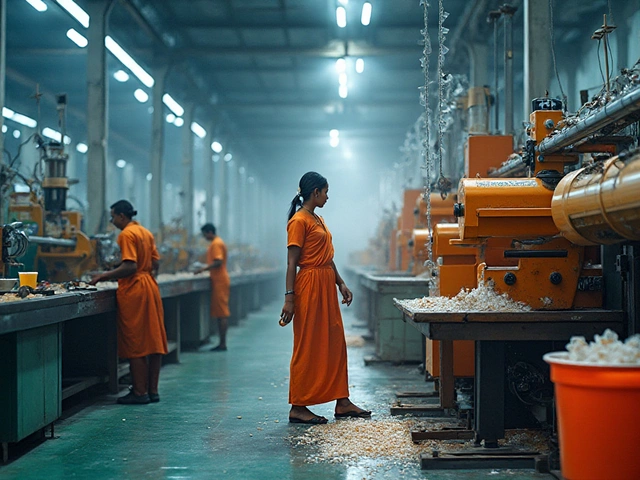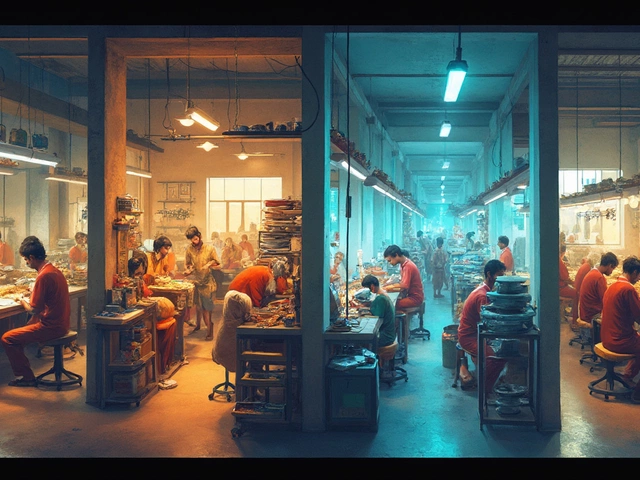When you think of skyscrapers, bridges, or industrial plants, you’re not just seeing steel-you’re seeing the work of steel fabricators. These companies take raw steel plates, beams, and bars and turn them into the exact shapes and structures that hold up our modern world. But who’s the biggest player in this space? If you’re asking who the largest steel fabricator in the United States is, the answer isn’t just about size-it’s about scale, reach, and the sheer volume of projects they handle every year.
The Top Contender: Nucor Corporation
Nucor Corporation isn’t just a steel producer-it’s the largest steel fabricator in the United States by volume, revenue, and physical footprint. Headquartered in Charlotte, North Carolina, Nucor operates over 200 facilities across 24 states, including more than 30 dedicated steel fabrication plants. These aren’t small shops; they’re massive, automated facilities that produce structural steel, rebar, plate products, and custom components for everything from wind turbines to highway overpasses.
Nucor’s fabrication division handles over 12 million tons of steel annually. That’s more than the entire annual output of many countries. Their fabrication plants use robotic welding, precision cutting systems, and real-time quality control to ensure every beam meets exact engineering specs. They don’t just make steel-they engineer solutions for construction firms, energy companies, and government infrastructure projects.
What Makes a Steel Fabricator “Largest”?
“Largest” can mean different things. Is it revenue? Number of employees? Physical plant size? Production volume? For Nucor, it’s all of the above. But here’s what sets them apart from competitors:
- Vertical integration: Nucor owns its scrap yards, mini-mills, and fabrication plants. This means they control every step from raw material to finished product, cutting costs and lead times.
- Speed to market: Their fabrication facilities can turn around complex structural steel orders in 2-4 weeks-half the industry average.
- Customization: They don’t just mass-produce standard I-beams. They fabricate custom trusses, moment frames, and seismic bracing systems for high-rise buildings in earthquake zones.
Compare that to companies that only cut and bend steel. Nucor designs, fabricates, and delivers fully assembled structural systems. That’s why contractors in Texas, California, and New York all rely on Nucor for major projects.
Other Major Players in the U.S. Steel Fabrication Market
Nucor dominates, but they’re not alone. Other significant steel fabricators include:
- Steel Dynamics: Based in Indiana, they’re the second-largest U.S. steel producer and operate several fabrication centers focused on structural shapes and rebar. Their output is huge, but they don’t match Nucor’s fabrication diversity.
- Midwest Steel & Iron: A regional powerhouse with plants in Ohio and Illinois. They specialize in heavy fabrication for industrial plants and power generation equipment.
- Welding & Fabrication, Inc. (WFI): A top-tier fabricator for aerospace and defense contractors. They handle precision steel components for military vehicles and aircraft, but their total volume is much smaller than Nucor’s.
- McDonnell & Miller: Known for custom steelwork in bridges and transportation infrastructure. They’ve worked on major projects like the Golden Gate Bridge upgrades and the new Tappan Zee Bridge.
None of these companies come close to Nucor’s scale. Steel Dynamics produces about 7 million tons of steel a year-less than two-thirds of Nucor’s output. And while WFI and McDonnell & Miller are highly respected, they serve niche markets. Nucor serves the entire construction and energy sector.

How Nucor Stays on Top
Nucor didn’t get big by accident. Their strategy is built on three pillars:
- Technology investment: They spend over $200 million annually on automation. Their latest fabrication plant in Alabama uses AI-driven quality inspection systems that catch defects 99.8% of the time.
- Employee ownership culture: Over 90% of Nucor’s workforce is non-union, and employees earn bonuses based on productivity. This keeps labor costs low and quality high.
- Strategic acquisitions: In 2023, they bought a major fabrication firm in Texas that specialized in oil and gas piping systems. That single purchase added 1.2 million tons of annual capacity.
They also have a massive logistics network. Nucor owns its own fleet of flatbed trucks and railcars to move steel from fabrication plants to job sites. That’s rare in the industry-most fabricators rely on third-party haulers.
What Nucor Fabricates
Nucor doesn’t just make beams. Their fabrication plants produce:
- Structural steel for high-rises (like the new Amazon HQ2 towers in Arlington)
- Bridge girders and deck panels for interstate projects
- Wind turbine towers and foundations for offshore and onshore farms
- Custom steel frames for data centers and warehouse distribution hubs
- Rebar and reinforcing systems for concrete construction
Every year, Nucor fabricates enough steel to build 200 full-sized bridges. Or 150 skyscrapers. Or enough structural components to cover 300 football fields in steel.

Why Size Matters in Steel Fabrication
Big isn’t just about bragging rights. In steel fabrication, scale equals reliability. When a construction company is building a 50-story hospital in Chicago, they need steel delivered on time, every time. They can’t afford delays from a small fabricator running behind.
Nucor’s size means:
- They can absorb sudden demand spikes-like after a hurricane when rebuilding surges.
- They have multiple plants, so if one shuts down for maintenance, others pick up the slack.
- They can offer fixed pricing for large contracts because they control raw material costs.
Smaller fabricators can be faster for small jobs, but for anything over $5 million in steel, contractors almost always go with Nucor.
Is Nucor the Right Choice for Every Project?
No. For a small custom metal staircase or a local church’s steel roof truss, a regional fabricator might be cheaper and more responsive. Nucor’s minimum order sizes are often in the hundreds of tons. They’re built for large-scale, high-volume work.
But if you’re a general contractor on a major infrastructure project, or a developer building a new industrial park, Nucor is the only fabricator that can guarantee delivery, quality, and volume without breaking your schedule.
The Future of Steel Fabrication in the U.S.
The U.S. steel fabrication industry is growing. The Infrastructure Investment and Jobs Act of 2021 poured over $550 billion into roads, bridges, and public works. The Inflation Reduction Act is funding thousands of wind and solar projects-all needing massive amounts of structural steel.
Nucor is investing $1.5 billion in new fabrication plants between 2024 and 2027. They’re building one in Georgia to serve Southeastern infrastructure projects and another in Nevada to supply renewable energy construction.
Other companies are trying to catch up. But with their control over the entire supply chain, their automation edge, and their workforce model, Nucor isn’t just the largest steel fabricator today-they’re positioned to stay that way for the next decade.
Who is the largest steel fabricator in the United States?
Nucor Corporation is the largest steel fabricator in the United States. They operate over 30 dedicated fabrication plants, handle more than 12 million tons of steel annually, and supply structural components for major infrastructure, energy, and commercial projects nationwide.
What does a steel fabricator do?
A steel fabricator cuts, bends, welds, and assembles raw steel into structural components like beams, columns, trusses, and plates. These parts are then shipped to construction sites to build buildings, bridges, factories, and other large structures.
How is Nucor different from other steel companies?
Unlike companies that only produce steel, Nucor controls the entire process-from scrap recycling and mini-mill production to final fabrication and delivery. They also use advanced automation, have a performance-based workforce model, and own their logistics network, giving them unmatched efficiency and scale.
Can small fabricators compete with Nucor?
Small fabricators can compete on custom, low-volume jobs or in local markets where speed and personal service matter. But for large-scale projects requiring hundreds of tons of steel, consistent quality, and tight deadlines, Nucor’s scale and infrastructure make them the preferred choice.
What industries rely on U.S. steel fabricators?
Construction, energy (wind and solar), transportation (bridges and rail), manufacturing plants, data centers, and government infrastructure projects all depend heavily on U.S. steel fabricators. Nucor supplies steel for all of these sectors.
Steel fabrication isn’t glamorous, but it’s the backbone of modern America. From the beams holding up your office building to the towers carrying wind energy across the plains, it’s Nucor’s steel doing the heavy lifting.






